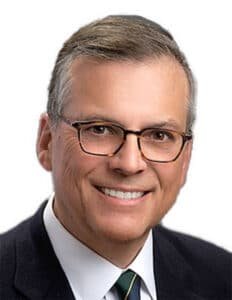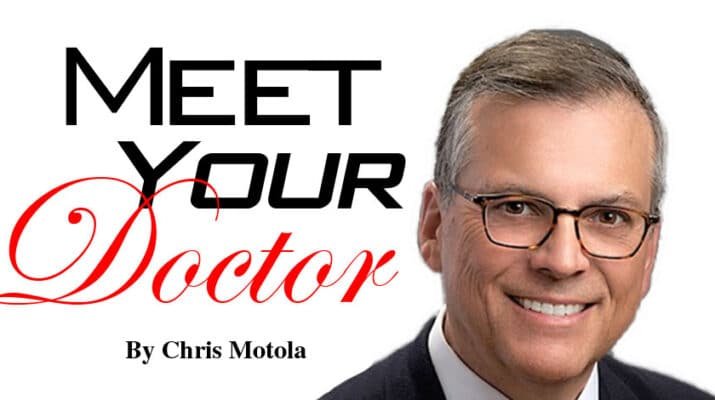Physician becomes St. Joe’s new chief medical officer during the pandemic. He talks about his new position and how his idea helped the hospital secure enough N95 medical masks at a time of profound shortage
By Chris Motola

Q: You were promoted to chief medical officer last year. Seems like a crazy time to step into that role. How has that been?
A: It really was. I was the medical director of quality for the first part of the COVID storm. Since October, I’ve been chief medical officer and we’re right back in it after a lull. Now we’ve got the vaccine, but we’re still trying to navigate some very choppy waters. It’s definitely a very challenging time to take over as CMO. I have done my best to try to help my medical staff understand what we’re up against and what we’re asking of them to help us get through this — from rearranging surgery schedules to asking some people to accept some compensation reductions, a lot of things that have helped us manage our way through this in a way that preserves our quality of care.
Q: How is the rollout of the vaccine going?
A: I think it’s been going relatively well. I think there are always going to be issues when you’re talking about such a large scale project as is being attempted. New York state has provided us with vaccine to be used. We are using it very efficiently here. We used our first 3,000 doses and are now into our next allotment. We’ve vaccinated over 3,300 members of the our staff and affiliated members of healthcare community [as of mid-January]. So I think we’re making great headway. We’re getting ready for the next phase, which we’re coordinating with the county, which will be vaccinating people 75 years old and older, but a lot of the details are still being worked out.
Q: Which of the two vaccines are you using?
A: We have access to both the Pfizer and the Moderna vaccines, and we’ve used them both on staff. They’re very similar. They are mRNA vaccines. They’re both very effective, better than 94% effective at preventing COVID. Pfizer’s is three weeks between the two doses, Moderna is four weeks. Once you have the second dose, after a few weeks you’re very well protected against the virus. We haven’t had any major problems related to these vaccines, just some typical minor things like arm pains and headaches. Most people having been doing quite well, and it’s been very well-received by our staff.
Q: You introduced a method of sterilizing N-95 masks. How does that work, and what affect has it had on the hospital?
A: Back in the early days of the pandemic, we were having the same problems as most other hospitals, which was that we weren’t able to get the amount of PPE [personal protection equipment] that we needed for day-to-day patient care and needs. I had been doing some research on it and found that Duke [University] was using a vaporized hydrogen peroxide system to do decontaminate the masks. So I looked into that, realized we could potentially do that and was able to locate a machine — one of the last ones in New York state. I was able to work with finance to get the machine here. We converted one of our older cardiac catheterization labs on the second floor to a hydrogen peroxide chamber. That allowed us to decontaminate masks and reuse them. That gave us the ability to really extend our supplies. We were able to do that. We had over 5,000 masks we were able to reprocess that way. This gave us the comfort of knowing we had back-up masks we could use to protect our staff, especially the nurses in our COVID-positive unit, who desperately need them every day. So I think that was very helpful.
Q: Are you still decontaminating masks on site?
A: We needed our personnel and that space back when we resumed surgery, so we outsourced the hydrogen peroxide decontamination to another company.
Q: How long can you extend the lifespan of these masks with this method? What’s the limit?
A: I think the testing that was done found that it could be done up to 20 times. We did it up to 10 times without any issues. We were preserving the ones we had without having to throw them out.
Q: How much money did the hospital save this way? Or is that besides the point?
A: It’s kind of besides the point although, as you can imagine, the masks were becoming a lot more expensive. The supply was going down and the demand was very high. Cost wasn’t really the issue for us though, we just needed a ready supply. We were still able to source the masks, but unfortunately some of them were only available in larger sizes, so having the ability to reprocess the masks that our staff were most comfortable in was important. And just knowing they were available was comforting to the staff. It helped at a time when we really weren’t sure what was coming down the road at all.
Q: Has this process become more widely adopted?
A: I think it is being used more commonly now. As I said, we’re no longer doing this onsite, but we are still using it. A lot of hospitals around the country have started to do it because we are in crisis capacity so far as PPE goes. It’s more available than it was, but it can still be a little bit difficult to source the amount of masks you need in the sizes you need. So it’s still something that’s being done. There’s still a short supply of masks throughout the country and even throughout the world.
Q: You received a 2020 Excellence in Healthcare award for being a “healthcare innovator,” for this, correct?
A: Yes, it was an award given out by the Central New York Business Journal recognizing my contributions toward this endeavor at a time when no one else in our city was doing it. So it was just my contribution toward getting us past a crisis point.
Lifelines
Name: Philip Falcone, M.D.
Position: Chief medical officer at St. Joseph’s Health
Hometown: Syracuse
Education: SUNY Upstate Medical University
Affiliations: St. Joseph’s Health; Crouse Hospital
Highlights: Started at St. Joseph’s In 1991 as an attending physician in the department of plastic surgery. Member of the Governing Board of the St. Joseph’s College of Nursing and a past co-chairman for the Ambulatory Surgery Center Governance Committee. Also a member of the Onondaga Community College’s Surgical Technology Advisory Board
Organizations: American College of Surgeons; Onondaga County Medical Society; New York State Medical Society
Family: Wife, son
Hobbies: Crossword puzzles, reading (British mysteries, especially), golf

